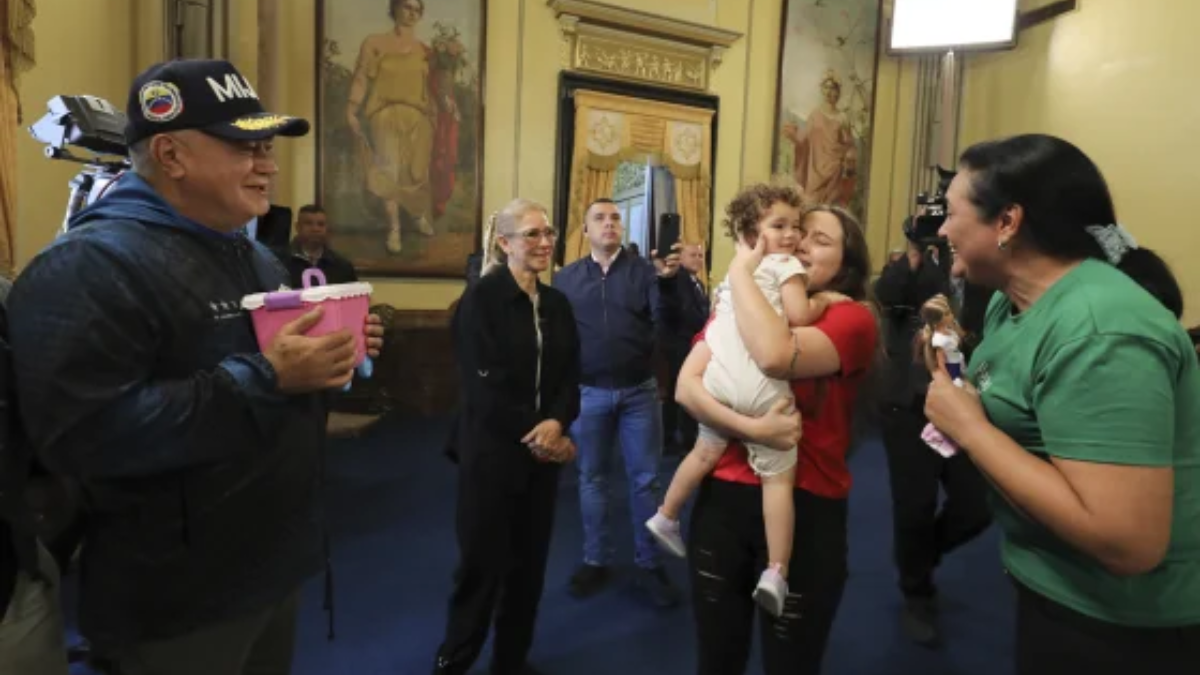A Venezuelan toddler who spent nearly a year separated from her parents in the United States was reunited with her mother in Caracas on May 14, 2025. The two-year-old girl, Maikelys Antonella Espinoza Bernal, had been held in U.S. custody since her parents were deported under controversial immigration policies that accused them of gang affiliations.
The emotional reunion has drawn both celebration and criticism, reviving debate about the impact of deportation laws on immigrant families.
How It All Began: A Family’s Asylum Journey
Maikelys and her parents, Yorely Escarleth Bernal Inciarte and Maiker Espinoza, left Venezuela in 2024 and crossed the U.S.-Mexico border in May of that year, seeking asylum from their home country’s economic instability and political unrest. They turned themselves in to U.S. immigration authorities in Texas and were placed in detention.
Shortly after their arrival, U.S. officials from the Department of Homeland Security (DHS) determined that the couple had ties to the Venezuelan gang “Tren de Aragua”—an accusation based largely on the presence of tattoos on the father.
DHS did not provide additional public evidence of gang membership or criminal activity. Despite these circumstances, the parents were deported: Yorely to Venezuela and Maiker to El Salvador, a country with which the U.S. maintains a strict deportation agreement.
Maikelys, only 15 months old at the time, remained in U.S. custody under the supervision of the Department of Health and Human Services’ Office of Refugee Resettlement (ORR).
The prolonged separation from her family quickly became a flashpoint in discussions about the treatment of migrants and asylum seekers, especially children.
Return Flight to Venezuela
On May 14, 2025, Maikelys was one of over 220 Venezuelans aboard a U.S. deportation flight to Caracas. The flight marked a rare and politically sensitive repatriation effort coordinated between U.S. and Venezuelan officials.
Upon arrival at Simón Bolívar International Airport, the toddler was greeted by Venezuelan First Lady Cilia Flores and Interior Minister Remigio Ceballos. She was later reunited with her mother, Yorely, and grandmother at the Miraflores Presidential Palace.
President Nicolás Maduro, who publicly welcomed the child home, thanked U.S. officials, including Special Envoy Richard Grenell, for their cooperation.
He also extended appreciation to former President Donald Trump, under whose immigration policies the deportation occurred. The reunion was broadcast live on state television and heralded by the Maduro government as a diplomatic victory.
Legal Controversy: Use of Alien Enemies Act
Maikelys’s father, Maiker Espinoza, was deported to El Salvador under a rarely used provision of the Alien Enemies Act of 1798. The law, designed for wartime, permits the U.S. president to detain or deport noncitizen nationals of enemy countries without trial.
Legal experts and human rights organizations have expressed deep concern about the expansion of such powers into immigration cases, especially when used to separate families without sufficient evidence or due process.
The Alien Enemies Act has not been widely used in modern times, and its application in this case has fueled fears of a return to hardline immigration enforcement tactics.
Advocacy groups argue that using tattoos as the sole basis for deportation—without a formal trial or criminal conviction—violates basic constitutional and human rights protections.
Echoes of Family Separation Policies
This incident has drawn comparisons to the 2018 family separation policy implemented during the Trump administration’s “zero tolerance” approach. Although later curtailed after widespread public outrage, the policy led to the separation of thousands of children from their families at the U.S. border.
In Maikelys’s case, critics argue that the separation occurred without sufficient judicial oversight or mechanisms for reunification. Immigration attorneys say the child’s prolonged placement in government custody could result in psychological trauma, particularly at such a formative age.
Diplomatic and Political Implications
The high-profile nature of Maikelys’s return highlights the ongoing complexities of U.S.-Venezuela relations. Despite the lack of formal diplomatic ties between the two countries, cooperation in this instance suggests a pragmatic shift—at least in isolated humanitarian cases.
President Maduro used the occasion to urge the U.S. to return Maiker Espinoza and accused Washington of targeting innocent Venezuelans with “fabricated charges.” He also called for greater respect for international norms on family unity and asylum rights.
From the U.S. perspective, officials have maintained that national security remains a top priority, citing the need to prevent individuals with potential criminal ties from entering or remaining in the country.
However, this stance has received criticism from legal scholars who argue that such approaches often lack transparency and proper legal procedure.
Broader Context and Continuing Debate
Maikelys’s story is one of many that exemplify the human toll of aggressive immigration enforcement.
While the case concluded with a reunion, it leaves behind lingering concerns about the treatment of children in U.S. immigration custody, the use of outdated laws for modern deportations, and the lack of consistent protocols for family reunification.
Lawmakers and human rights organizations are now calling for reforms that ensure greater oversight of immigration decisions involving minors and vulnerable populations. There is also growing pressure on both the Biden and Trump camps to clarify how future policies will address these humanitarian concerns.
Conclusion
The reunion of Maikelys with her mother in Venezuela is a relief for her family and supporters but underscores the ongoing challenges in U.S. immigration policy.
As both countries navigate delicate diplomatic relationships, stories like Maikelys’s serve as a reminder of the human consequences of immigration enforcement and the need for reforms that prioritize family unity and legal due process.
For more information on U.S. immigration and refugee policies, visit the official websites of the U.S. Department of Homeland Security and the Office of Refugee Resettlement.
Disclaimer – Our team has carefully fact-checked this article to make sure it’s accurate and free from any misinformation. We’re dedicated to keeping our content honest and reliable for our readers.
